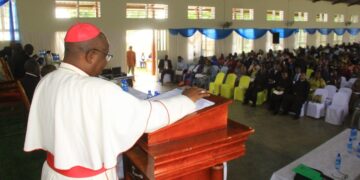Uganda’s economy is projected to grow by 6.3 percent in 2025, signaling a steady recovery. Yet, economists warn that mounting domestic borrowing and persistent supplementary budgets are undermining the country’s fiscal stability.
According to the Civil Society Budget Advocacy Group (CSBAG), Uganda’s public debt has soared to about 120 trillion shillings, half of which is domestic. Borrowing from local banks now accounts for 50 percent of total debt, up from 30 percent in 2021.
CSBAG notes that this shift toward domestic financing has significantly increased debt-servicing costs, as government pays interest rates between 15 and 17 percent—compared to just 2 to 3 percent on concessional loans.
Consequently, interest payments have surged from 3 trillion shillings in 2019 to 7 trillion in the 2025 financial year. Today, for every 100 shillings collected in taxes, 25 shillings go toward debt interest alone.
CSBAG warns that this trend is squeezing fiscal space for critical sectors such as health and education.
While government credits the growth momentum to investments in oil infrastructure and export promotion, analysts caution that repeated supplementary budgets are eroding fiscal credibility.
In the 2024/25 financial year, Parliament approved three supplementary budgets totaling 5.7 trillion shillings, primarily directed toward defense and energy projects.
Uganda’s fiscal deficit remains high at 6 percent of GDP and is projected to widen to 7.2 percent in the 2025/26 financial year—more than double the target set under the Charter of Fiscal Responsibility.
According to S&P, this trend could weaken investor confidence and delay fiscal consolidation.
Meanwhile, revenue performance has stagnated. Since 2019, government revenue has hovered around 14 percent of GDP, compared to 17 percent in Kenya and 15 percent in Rwanda. With such a narrow tax base, Uganda continues to rely heavily on borrowing to sustain government operations.
Commercial banks now hold nearly a third of their assets in government securities, finding it safer and more profitable to lend to government than to the private sector. This “crowding-out effect” has slowed private-sector credit growth to 8.2 percent, dampening business expansion and job creation.
CSBAG acknowledges that Uganda’s growth is genuine but stresses that it remains uneven and non-inclusive.
Gains from key exports such as gold and coffee are largely concentrated among elites and large corporations. Gold exports reached 4.2 billion dollars in 2025, dominated by UAE-based conglomerates, while small-scale miners benefit little.
Similarly, coffee producers—mostly smallholder farmers—earn only 20 to 30 percent of export value, as middlemen and cooperative elites take the largest share.
CSBAG argues that while S&P’s positive outlook reflects confidence in Uganda’s growth potential, it should not obscure deep fiscal vulnerabilities.
The group urges government to reduce reliance on costly domestic borrowing, enforce spending discipline, and accelerate tax reforms under the Domestic Revenue Mobilization Strategy.
It also calls for protecting social spending from being crowded out by debt servicing and managing future oil revenues transparently through dedicated savings mechanisms.
“The economy is growing, but fiscal discipline is not optional,” said CSBAG Executive Director Julius Mukunda. “Growth must translate into affordable borrowing, efficient spending, and better services for citizens.”
Uganda’s growth story remains compelling. But without tighter control of debt and stronger fiscal governance, the promise of sustainable and inclusive development may prove short-lived.

































